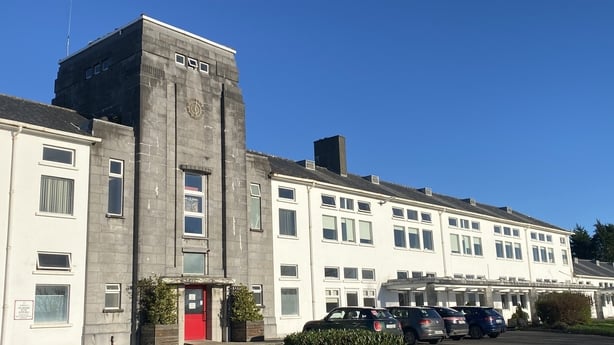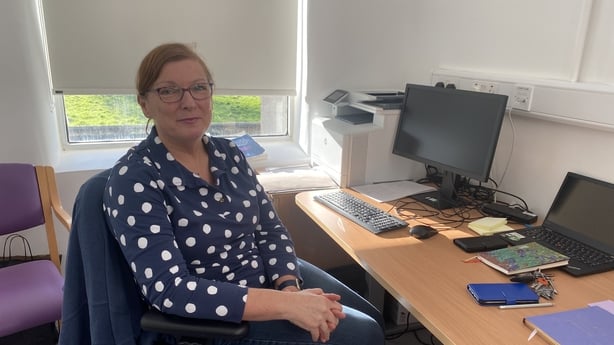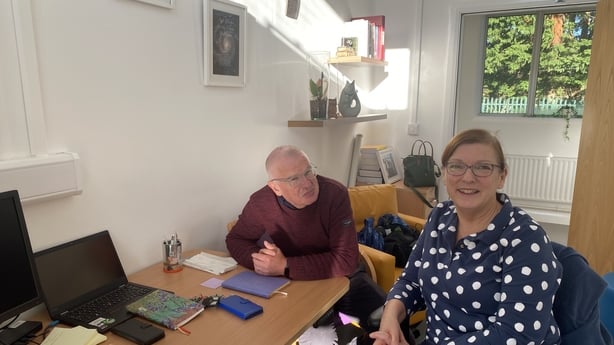The Mental Health Commission has called for a nationwide roll out of crisis resolution teams to treat patients with mental illnesses at home.
Specialist teams being piloted at five locations also feature a crisis café where people can drop in for mental health support.
Mental Health Commission Chief Executive John Farrelly has also called for more crisis housing and step-down care for patients who are discharged.
He told RTÉ News that repeat admissions accounted for 67% of patients admitted to psychiatric units and hospitals in 2023.
"Out of 15,600 admitted to psychiatric beds, over 10,000 were repeat admissions and 5,600 were first-time admissions," he said.
"If we have step-down beds, rehabilitative beds, and crisis intervention teams, we are able to eat into that."
Speaking on RTÉ's News at One, he said that more community-based treatment would reduce first-time admissions, in line with 'Sharing the Vision’, the national mental health policy.
"We don't have these yet, they are sporadic around the country. That's what we need to invest in."
We need your consent to load this rte-player contentWe use rte-player to manage extra content that can set cookies on your device and collect data about your activity. Please review their details and accept them to load the content.Manage Preferences
Shortage
A third of patients in psychiatric beds in 2023 were there for over a year, according to the Health Research Board. A third of these were aged 65 or over.
The Irish Hospital Consultants Association has expressed concern over the shortage of available beds for public patients experiencing a serious mental health crisis.
Professor Anne Doherty said only the sickest patients could access a bed, with the illness threshold getting "higher and higher".
Mr Farrelly said that while more hospital beds were needed, most people would rather be treated in their own homes, where possible.
"That absolutely is the way to go. The evidence is there but we need to roll it out," he added.
Read more: Psychiatrists warn of health risk due to bed shortage
Evolving mental health landscape
The building that houses the HSE Crisis Resolution Team in Sligo tells a story of Ireland's evolving mental health landscape.
It's a two minute walk from the imposing 19th century "lunatic asylum", which closed its doors just 33 years ago, and is now a Clayton Hotel.
Up to a few years ago the building was home to Sligo's St Columba's Mental Hospital which succeeded the old institution.
Today, the building and its occupants performs a very different role for those experiencing a mental health crisis.

"Where we are standing now used to be the female admissions ward," said Dr Elizabeth Gethins, consultant psychiatrist with the Sligo Crisis Resolution Team.
The crisis resolution team is a pilot programme bringing top-tier treatment to patients with mental illnesses in their own homes.
"We operate 8am to 8pm seven days a week. Monday to Friday we take referrals, on weekends we provide a service for those already on our case load," she said.
Dr Gethins added: "That can start off needing to see people two or three times a day. Gradually we decrease the frequency as the person begins to recover and can get back on their feet again."
The team also runs the Solace café in Sligo town where people can drop in whenever the feel they need mental health support.
"About two thirds of our referrals are with depressed mood and suicidal ideation," Dr Gethins explained.
"We see people through a recovery from a psychotic episode at home, people with bipolar who are having a manic episode.
So is the team of doctors, nurses and other skilled personnel keeping people out of hospital?
"Yes!" Dr Gethins said emphatically. "There's no question that if we were not here as a service a lot of the people that we see would end up having to be admitted."

The crisis resolution team is one of five across the country. Others are being trialled in Cork, Waterford and Dublin.
The team consists of around ten specialists with different skillsets for treating patients in crisis.
Team member Enda Moylan travels to homes across Sligo, Leitrim and west Cavan, a population area of 120,000 people.
His journey is usually on foot of a referral from a GP or hospital.
"We'll respond as quickly as we can and pride ourselves in getting out there and meeting people in their own homes," he said.
Mr Moylan, who has worked in mental health for four decades, said team members speak with each patient about their needs.
"The difference today is huge. It's really responsive. We meet families and provide the service that people themselves want, " he added.
The team also operates the Solace café in Sligo, a space where patients can come if they need extra support.
"Some people might be coming in after a days work," Dr Gethins said, adding that certain patients want to maintain their daily work of family schedules while undergoing treatment for depression or anxiety.

Dr Gethins also said inpatient care will always be needed for severe cases of anxiety, depression and psychosis.
However, hospitals and doctors’ offices - she feels - take people out of their reality instead of helping them cope with it.
"People can dress up and come to an outpatient clinic and present a certain version of themselves.
"When we see them at home, we see that the house is bare, things are cluttered or there is no heating, and we can help them with that."
After just over a year in operation, she said patient feedback has been very encouraging.
"People are very nervous in the beginning about managing an episode at home but once we gain their confidence and trust, people are very confident about their experience with us."
So will these crisis teams be rolled out nationwide?
The Department of Health told RTÉ News that the intention was to scale up the current five crisis resolution teams nationally "on a phased basis".
It added that Solace cafés are due to open at two more locations this year, bringing the total to seven.
A HSE statement said that an independent evaluation of this model of care was currently under way and decisions would depend on the outcome.
If you have been affected by the issues raised, a list of helplines can be found here.







